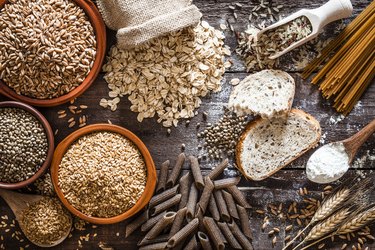
Carbohydrates are one of three macronutrients, along with protein and fat, that you need in fairly large quantities to maintain your life and important body functions.
They provide the most desirable form of energy for your body in the form of glucose and provide 4 calories per gram. When you eat carbohydrates, your body breaks them down into glucose, which enters your bloodstream and provides energy to your cells. Eating adequate amounts of carbohydrates every day ensures that your body has access to enough glucose to function properly.
Video of the Day
Video of the Day
Nutritionists and public health officials still encourage you to get most of your calories from this nutrient, so it's important to learn to identify high-quality, healthy carbohydrates.
The Basic Structure of Carbohydrates
A carbohydrate is a simple sugar. Carbs are composed of the elements carbon, hydrogen and oxygen, with generally twice the hydrogen as carbon and oxygen (this is the main characteristic of carbohydrates), according to Oregon State University.
In its simplest form, a carbohydrate is a chain of sugar molecules called monosaccharides. When these simple sugars are combined, you get disaccharides, oligosaccharides and polysaccharides.
Carbohydrates are separated into two major categories: simple carbohydrates and complex carbs. Simple carbohydrates refer to those that contain one sugar molecule or two sugar molecules linked together. Complex carbohydrates are those that contain three or more sugar molecules linked together. In some cases, these chains can contain hundreds of sugars.
Carbohydrates in Foods
Simple vs. Complex Carbs
The properties of carbohydrates you choose affect how your body responds to them. In your diet, you can eat simple carbs or complex carbs.
Simple carbs include sugars found naturally in foods like fruits, vegetables, milk and products made from milk. You'll also add a lot of simple carbs to your diet if you eat processed foods and soft drinks.
Complex carbs are found in whole-grain foods like breads and cereals. You'll also find them in starchy vegetables and legumes, like beans.
Whole vs. Refined
When deciding which carbohydrates you want to eat, it is beneficial to choose whole carbohydrates rather than refined carbohydrates. Whole carbohydrates contain all parts of the wheat kernel, which includes the germ, endosperm and bran.
Refined carbohydrates undergo extensive processing that removes the bran and germ. The refining process makes these carbohydrates more shelf-stable and visually appealing, but it also removes important nutrients, such as fiber, iron and B vitamins, according to the USDA.
Examples of healthy foods high in complex carbohydrates include:
- whole grains
- whole-wheat pasta
- brown rice
- oats
- fruits
- vegetables
- beans
Refined carbohydrates include:
- white bread
- white pasta
- white rice
- candy
- fruit juice
Fiber
Fiber is an important type of carbohydrate found in plant foods. The benefits of fiber include helping regulate your bowel function, lower your risk of developing hemorrhoids and colon pouches, lower your cholesterol and control your blood sugar.
Related Reading
Energy Is the Main Function of Carbs
Carbs are your body's main source of fuel. They are most easily converted to glucose, which is used by your cells for energy. All your body's systems and organs need glucose to function properly. Carbs also spare your muscle when your body goes looking for energy.
If you eat a low-carb diet, your body will turn to fat tissue next, but then will begin to use your muscle if it must. Excess carbohydrates not immediately used for energy gets stored as glycogen. When glycogen storage reaches capacity, the excess carbohydrates get stored as fat, according to Columbia University.
While the use of carbohydrates as an energy source in your body is important in its own right, the presence of carbohydrates prevents the body from using protein in the body for energy.
Glycemic Index
All carbs are not made the same. When carbs are detached from fiber, they are processed rather quickly, causing a rapid increase in your blood sugar and insulin levels, per Harvard Health Publishing.
Carbs that do this are called high-glycemic. High-glycemic diets are associated with diabetes and obesity. Complex carbs tend to be low-glycemic, keep your blood sugar relatively stable and digest more slowly. The glycemic index categorizes carbs based on their effect on blood sugar, relative to simple sugar. A food scoring higher than 70 is considered high-glycemic.
Daily Reference Intake
The Institute of Medicine recommends that 45 to 65 percent of your daily calories come from carbohydrates. You need between 20 and 35 grams of fiber. It's important to choose your carbs wisely, however.
Carbs from processed foods tend to come with extra calories that will make controlling your weight more difficult. It recommends you get most of your carbs from the basic food groups, including fruit, vegetables and whole grains.
Was this article helpful?
150 Characters Max
0/150
Thank you for sharing!
Thank you for your feedback!